
International Review of Sport and Exercise Psychology
Scope & Guideline
Advancing the psychology of performance and well-being.
Introduction
Aims and Scopes
- Psychological Interventions in Sport and Exercise:
The journal emphasizes research on various psychological interventions aimed at enhancing performance and well-being in athletes and exercise participants. This includes systematic reviews and meta-analyses evaluating the effectiveness of these interventions. - Mental Health and Well-being in Sport:
A core area of focus is the mental health outcomes associated with participation in sport and exercise, particularly among youth and vulnerable populations. Studies explore the impact of physical activity on psychological well-being and the role of sport in mental health interventions. - Developmental and Educational Psychology in Sport:
The journal highlights research on developmental aspects of sport participation, including talent development, parental influence, and the psychosocial outcomes of youth sports. This includes the application of educational theories to sport psychology. - Cognitive and Emotional Processes in Sport:
Research examining cognitive functions, emotional regulation, and resilience in sports is a significant theme. This includes studies on attentional focus, self-talk, and coping strategies. - Methodological Innovations in Sport Psychology Research:
The journal encourages innovative methodologies for studying sport and exercise psychology, such as meta-analyses, scoping reviews, and qualitative research approaches that advance the field's understanding.
Trending and Emerging
- Integration of Mental Health in Sport:
There is a growing focus on the intersection of sport, exercise, and mental health, particularly regarding interventions that aim to improve mental well-being among athletes and exercise participants. This trend highlights the importance of addressing psychological health alongside physical performance. - Research on Youth Development and Life Skills:
Emerging themes include the role of sport in promoting life skills and positive youth development, with systematic reviews exploring how participation in sports can foster resilience, social skills, and personal growth among young athletes. - Exploration of Esports and Digital Athletes:
The rise of esports has led to increased research on the psychological aspects of competitive gaming, including stressors, coping strategies, and the unique motivations of esports athletes, reflecting the expanding scope of sport psychology. - Holistic Approaches to Performance and Well-being:
There is an increasing trend towards holistic models that consider the interplay between physical, emotional, and social factors in athletes' performance and well-being, moving beyond traditional performance psychology. - Parent and Coach Influences in Youth Sports:
Research focusing on the dynamics of coach-parent relationships and their impact on youth sport experiences is gaining attention, highlighting the importance of social environments in athlete development.
Declining or Waning
- Traditional Performance Psychology:
There is a noticeable decline in research focusing solely on traditional performance-enhancement techniques, such as visualization and self-talk, as newer approaches that integrate broader psychological and contextual factors gain traction. - Narrow Focus on Elite Athlete Populations:
Research centered exclusively on elite athletes is becoming less common, with a shift towards inclusive studies that consider diverse populations, including youth, non-elite athletes, and individuals with mental health challenges. - Single-Dimensional Studies on Motivation:
The journal has seen fewer studies that approach motivation from a singular perspective, such as intrinsic vs. extrinsic motivation, as more complex and multifaceted models are being adopted.
Similar Journals

MEDICINA DELLO SPORT
Advancing Excellence in Sports Medicine and RehabilitationMEDICINA DELLO SPORT is a distinguished journal published by EDIZIONI MINERVA MEDICA, dedicated to advancing knowledge in orthopedics, sports medicine, and physical therapy. With its ISSN 0025-7826 and E-ISSN 1827-1863, this journal has been a pivotal platform for scholarly research since its inception in 1965, enhancing the understanding of various aspects of sports health and rehabilitation. Although it currently does not offer open access, it maintains a reputable stance in academic publishing, ranking in Q3 for both Orthopedics and Sports Medicine as well as Physical Therapy, Sports Therapy, and Rehabilitation, according to the latest metrics. With its inclusion in Scopus and a strong presence in important health professions, MEDICINA DELLO SPORT is crucial for researchers, professionals, and students aiming to explore and contribute to the evolving field of sports medicine and therapies. It is published from its headquarters located at CORSO BRAMANTE 83-85 INT JOURNALS DEPT., 10126 TURIN, ITALY, ensuring a European perspective in global health discussions.

CURRENT PSYCHOLOGY
Shaping the Future of Psychological InquiryCURRENT PSYCHOLOGY is a renowned journal published by SPRINGER, focusing on a myriad of topics within the field of psychology. With its ISSN 1046-1310 and E-ISSN 1936-4733, this journal has established a significant footprint since its inception in 1981. Based in the United States, at One New York Plaza, Suite 4600, New York, NY 10004, CURRENT PSYCHOLOGY caters to an international audience of researchers, professionals, and students seeking to advance their understanding of both theoretical and applied psychology. Rated in the Q1 category for miscellaneous psychology in 2023 and holding a respectable rank of 58 out of 216 in the general psychology field according to Scopus, the journal emphasizes high-quality research and innovation. While it does not currently offer open access, it is committed to disseminating essential insights that address contemporary psychological issues, promoting a deeper engagement with the evolving landscape of psychology.
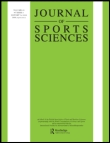
JOURNAL OF SPORTS SCIENCES
Elevating the standards of sports science and practice.The JOURNAL OF SPORTS SCIENCES, published by TAYLOR & FRANCIS LTD, serves as a premier platform for disseminating influential research in the fields of sports science, orthopedics, and rehabilitation. With an impressive ISSN of 0264-0414 and E-ISSN of 1466-447X, this UK-based journal has established a significant presence in the academic community since its inception in 1983, continuing to thrive through 2024. It holds a coveted Q1 ranking across multiple disciplines including Orthopedics and Sports Medicine, and ranks 30th in Physical Therapy, showcasing its relevance and impact in the health professions sector. Although the journal does not currently offer open access, it remains a critical resource for researchers, professionals, and students dedicated to advancing knowledge and practice in sports sciences. The journal's commitment to publishing high-quality, peer-reviewed articles ensures that it remains at the forefront of innovation and discovery in sports-related health and rehabilitation.
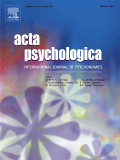
ACTA PSYCHOLOGICA
Unlocking the mysteries of the mind since 1936.ACTA PSYCHOLOGICA, published by Elsevier, is a leading journal that has served the field of psychology since its inception in 1936. With an impact factor that reflects its authority and significance in the discipline, this journal has become essential for researchers, professionals, and students alike. Open Access since 2021, ACTA PSYCHOLOGICA ensures that groundbreaking psychological research is widely accessible, promoting the dissemination and application of knowledge across various branches of psychology including Developmental and Educational Psychology and Experimental and Cognitive Psychology. The journal is categorized in the Q1 and Q2 quartiles, highlighting its high-quality contributions to the field, supported by robust rankings within Scopus. Located in Amsterdam, Netherlands, this journal remains a vital resource for advancing psychological science and fostering collaborative research worldwide.
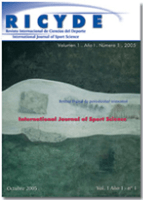
RICYDE-Revista Internacional de Ciencias del Deporte
Elevating Standards in Sports Science and Rehabilitation ResearchRICYDE-Revista Internacional de Ciencias del Deporte is a leading scholarly journal dedicated to the field of sports science, physical therapy, and rehabilitation, published by Ramon Canto Alcaraz from Spain. Since its inception in 2005, this Open Access journal has been at the forefront of disseminating impactful research, promoting advancements in therapeutic practices and sports rehabilitation strategies. With an impact factor reflecting its quality and relevance in the academic community, RICYDE holds notable rankings within the Scopus database, particularly achieving a Q3 category in Physical Therapy, Sports Therapy and Rehabilitation for 2023, and a Q4 in Sports Science. Its multidisciplinary focus and commitment to accessible research make it an invaluable resource for researchers, professionals, and students seeking to enhance their understanding and application of sports sciences. The journal’s extensive archive is continually updated, making it a vital tool for those engaged in health professions and allied fields.

Revista Iberoamericana de Psicologia del Ejercicio y el Deporte
Innovating Insights for Sports and Exercise ScienceRevista Iberoamericana de Psicologia del Ejercicio y el Deporte is a pivotal resource in the fields of psychology and sports science, published by the esteemed REVISTA IBEROAMERICANA PSICOLOGIA EJERCICIO & DEPORTE in Spain. With an ISSN of 1886-8576 and an E-ISSN of 2340-7700, this journal serves as a platform for researchers, professionals, and students to explore the intersection of psychology, exercise, and sports. Although it currently holds a Q4 quartile rating in Applied Psychology, Social Psychology, and Sports Science, its presence in these diverse categories emphasizes its commitment to fostering inter-disciplinary collaboration and understanding. The journal has undergone significant transformations since its inception in 2012 and aims to stimulate advancements in knowledge and practices related to exercise and sport psychology. Despite its discontinuation from Scopus coverage in 2024, the journal continues to publish original research, reviews, and theoretical papers that contribute to the body of knowledge in its respective fields. With open access options available, it encourages broad dissemination and engagement with its scholarly contributions, making it an invaluable asset for those invested in the realms of psychology and sports.

European Journal of Human Movement
Uncovering Trends in Human MovementThe European Journal of Human Movement, published by the University of Extremadura, Faculty of Sports Sciences in Spain, stands as a vital resource within the realms of Health, Physical Therapy, and Social Sciences. With its consistent commitment to Open Access since 2014, the journal facilitates the dissemination of high-quality research, fostering innovation and collaboration among scholars, practitioners, and students alike. The journal has carved out a niche in its categories, being ranked in the Q3 quartile across several fields, including Health (social science) and Physical Therapy, Sports Therapy, and Rehabilitation. With an ongoing publication timeline extending from 2019 to 2024, it aims to highlight contemporary issues, emerging trends, and groundbreaking studies within human movement sciences. Additionally, with its presence in the Scopus ranking and a determination to elevate research standards, the journal remains an essential platform for sharing knowledge and advancing professional practice in a rapidly evolving landscape.
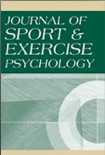
JOURNAL OF SPORT & EXERCISE PSYCHOLOGY
Advancing Understanding of Sport and Exercise BehaviorJOURNAL OF SPORT & EXERCISE PSYCHOLOGY, published by Human Kinetics Publishing Inc, stands as a premier resource in the realms of Applied Psychology and Sports Science. With a dedicated focus on the psychological aspects of sport and exercise, this journal delivers empirical research, critical reviews, and practical insights that are essential for practitioners, researchers, and students alike. Since its inception in 1996, the journal has shown remarkable growth, now garnering a commendable impact factor reflected in its Q2 and Q3 quartile rankings across relevant fields. Although not an open access journal, it facilitates access to rigorously evaluated content that contributes significantly to the understanding of psychological processes in athletic performance and physical activity. With its rich blend of theoretical and applied perspectives, the JOURNAL OF SPORT & EXERCISE PSYCHOLOGY is positioned as an indispensable tool for enhancing knowledge in both academic and applied settings.
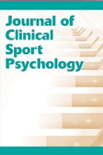
Journal of Clinical Sport Psychology
Elevating Athletic Performance through Mental Mastery.Journal of Clinical Sport Psychology, published by HUMAN KINETICS PUBL INC, is a leading academic journal that delves into the intricate interfaces of psychology and sport, offering critical insights into mental performance, athlete wellbeing, and coaching strategies. With its ISSN 1932-9261 and E-ISSN 1932-927X, this journal serves as a vital resource for researchers, professionals, and students interested in applied psychology, highlighting groundbreaking studies and innovative practices since its inception in 2007. Boasting a commendable impact factor and ranking within the Q2 category for Applied Psychology, it is recognized for fostering scholarly dialogue and advancing knowledge in areas such as sport performance enhancement, mental health in athletics, and the psychological aspects of physical training. While currently not open access, it remains a crucial publication for those seeking to elevate their understanding of the psychological dynamics at play in sports contexts. For those looking to stay abreast of the latest research trends in this evolving field, the Journal of Clinical Sport Psychology is an indispensable addition to any academic library.
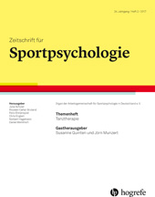
Zeitschrift fur Sportpsychologie
Innovating Strategies for Mental Wellness in SportsZeitschrift für Sportpsychologie, published by HOGREFE VERLAG, is a leading academic journal dedicated to the field of sports psychology, promoting empirical research and theoretical advancements from both applied and rehabilitative perspectives. Since its inception in 2008, this Germany-based journal has emerged as an essential resource for researchers, professionals, and students interested in the psychological aspects of sports and physical activity. With an ISSN of 1612-5010 and an E-ISSN of 2190-6300, it currently ranks in the Q4 category for Applied Psychology and Physical Therapy, Sports Therapy and Rehabilitation, reflecting its niche yet significant contribution to the field. Despite its young age, the journal fosters a dynamic discourse by encouraging innovative studies and reviews that enrich understanding of psychological mechanisms in sports and exercise settings. Access options are available through various academic platforms, ensuring that critical findings reach a wide audience. By bridging the gap between psychological research and practical application, Zeitschrift für Sportpsychologie plays a pivotal role in enhancing mental wellness and performance in sports, making it a vital publication for anyone keen on advancing their knowledge in this rapidly evolving discipline.